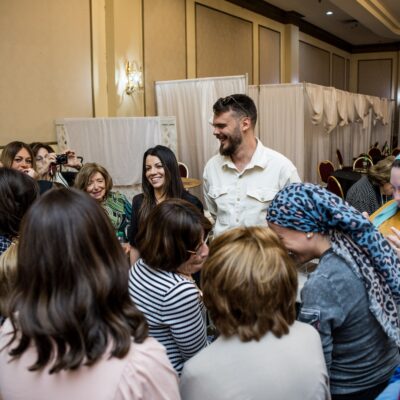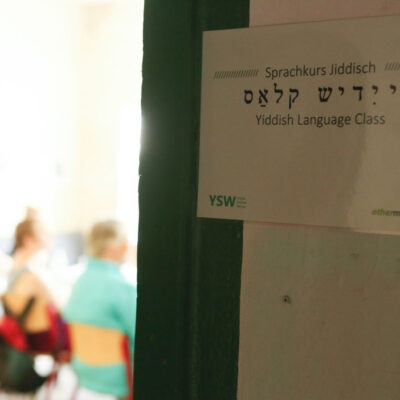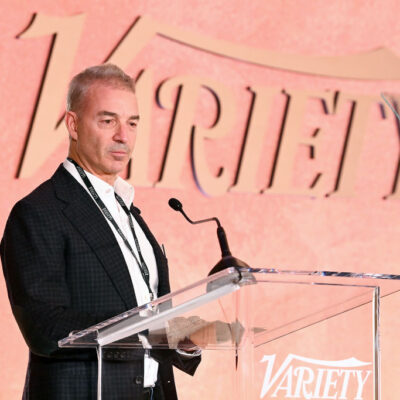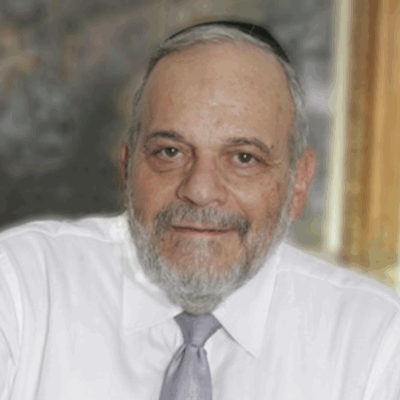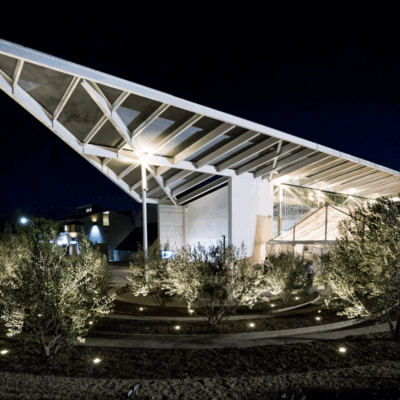Opinion
A COMMUNAL ISSUE
We’re all trapped in a pregnant pause, but infertility struggles don’t stop for wartime
A pregnant pause. As a literature major and self-proclaimed wordsmith, I love that phrase. It carries weight and substance that a regular old pause simply can’t. It’s a pause that actively takes up space and looms with possibility — or dread.
For “infertility warriors,” as many like to label us, that latter description probably holds most true. For those of us who’ve struggled to build a family in the way our society has drilled into us to expect, the very idea of pregnancy can pull the air from our lungs. We wait for another disappointment, or a hope that has yet to be fulfilled (or, in my case, never will be).
Since Oct. 7, the Jewish community at large has been in a prolonged pregnant pause, a particularly apt description last month when we passed the nine-month mark since that horrific day. In many ways, our lives are at an anticipatory standstill. We wait each day for news of the hostages, check and recheck lists of soldiers who’ve been killed to see if they’re familiar and read daily reports of the latest antisemitic incidents happening around the world.
We hold our breath, our lungs and hearts filled with hope, despair, tragedy, defeat, tears, anger and grief.
Anyone who has experienced the pain of infertility, pregnancy loss or the myriad other struggles that can come with trying to build a family knows these feelings well. Hope drives us to continue pushing forward, while despair, sadness, anger and defeat keep pulling us back, a treadmill to nowhere.

While it may seem like life has been on hold for the past 10 months for the Jewish nation as a whole, millions across the spectrum of the Jewish community have continued to experience the anguish of miscarriage or stillbirth, of yet another negative pregnancy test, of watching their friends build their families seemingly easily — all while dealing with the same ongoing heartbreak we’ve all been experiencing since Oct. 7.
Ten months feels like an impossibly long time for our people to sit with these feelings, utterly helpless to change the circumstances, try as we might.
But for those struggling to build a family, the reality of vacillating between hope and despair is a state that can last for years. Even if someone does eventually have the baby they hoped and prayed for — with time, patience, a lot of money, heartache and grief — they’re often left with lasting trauma from their experience. This can impact their work, relationships, mental health and physical health, not to mention how they handle the process of trying to add more children to their family should they choose.
Where do you turn when you’re dealing with emotional trauma that feels unrelenting, with no end in sight?
Personally, I found my safe haven in an organization called I Was Supposed to Have a Baby (IWSTHAB).
I discovered IWSTHAB when my husband and I were about a year into our fertility journey. At the time, though we’d already been through one failed IVF cycle (leading up to which my husband had to have two surgeries), we still had hope we’d find our way to parenthood. When a friend recommended I follow IWSTHAB on Instagram, finding an organization whose sole focus was providing emotional support and education for people in the Jewish community struggling to build a family felt like just what I needed as I navigated this new world.
Today, five years, three more failed IVF cycles, a miscarriage and a failed egg donor cycle later, I’ve had more opportunities to lean on IWSTHAB for support than I’d ever imagined I would need. Along with over 30,000 others, I follow IWSTHAB’s informative and emotionally validating Instagram posts and listen to their podcast; I have attended the support groups that are relevant to me, taken advantage of their comprehensive resource library. Additionally, I am now a member of IWSTHAB’s board of directors, as giving back to this cause is so personally meaningful to me.
Even after my husband and I came to the heartbreaking but necessary decision to end our journey to parenthood, I still lean on IWSTHAB for emotional support — because while our decision was the right one for me and my husband, it will never feel completely OK.
My fertility journey was more complex than some and less than others. No fertility journey is simple, and every circuitous path brings with it tremendous emotional strife.
Of course, IWSTHAB isn’t the only fertility organization serving the Jewish community. Jamie Betesh Carter recently wrote about her experience with The Stardust Jewish Fertility Foundation, for example, and Elana Frank wrote in eJewishPhilanthropy about her organization, the Jewish Fertility Foundation (JFF). These and other incredible organizations provide financial assistance to those going through fertility treatments, but IWSTHAB focuses on the emotional needs of those struggling to build a family, along with much needed community-wide education and advocacy.
Because, as a community, we’ve got a lot of work to do.
The immediate aftermath of Oct. 7 brought with it more Jewish unity than we’ve seen in decades, if not longer, but a common refrain across social media and from the pulpit has been that the best defense or revenge against our enemies is to make more Jewish babies.
This message is a slap in the face for anyone who’s struggled to bring said babies into the world. How can we be unified as a community when we so blatantly ignore the needs of so many of our own?
It’s not some tiny minority of people who struggle to build a family, after all: 1 in 6 people experience some form of infertility, and at least 1 in 4 pregnancies end in loss. That’s not to mention the countless others whose paths to parenthood are more challenging than most, like people who haven’t found a partner with whom to have a child, LGBTQ+ couples, those who’ve lost a child, and people building a family through adoption or surrogacy — just to name a few.
The Jewish people are at a precipice right now. We’re depleted, physically and emotionally, as we fight a multifront war, with Hamas, Hezbollah and factions around the world who aim to destroy us. We’re united in our efforts to fight the battles that need to be fought. What we can’t forget is that our might as a people has always come not just from our ability to fight for our physical survival but also from our ability to support each other.
Now, as the period of mourning we entered nearly three weeks ago culminates with Tisha b’Av on Tuesday, and we continue to exist within the pregnant pause we’ve been trapped in for 10 months, I urge you to remember those vacillating between hope and despair for months or years on end. Help IWSTHAB continue its work in creating more community-wide unity and supporting the emotional needs of those struggling to build a family. I wouldn’t have gotten through my experience with infertility without their support, and the same is true for many thousands more.
Rachel Honeyman is the founder of honeybebold, a branding and web design agency for female entrepreneurs. She’s a martial artist, a proud Orthodox feminist and, after a harrowing experience with infertility, she is childless-not-by-choice and sits on I Was Supposed to Have a Baby‘s board of directors. She and her husband live in Long Island, N.Y.

